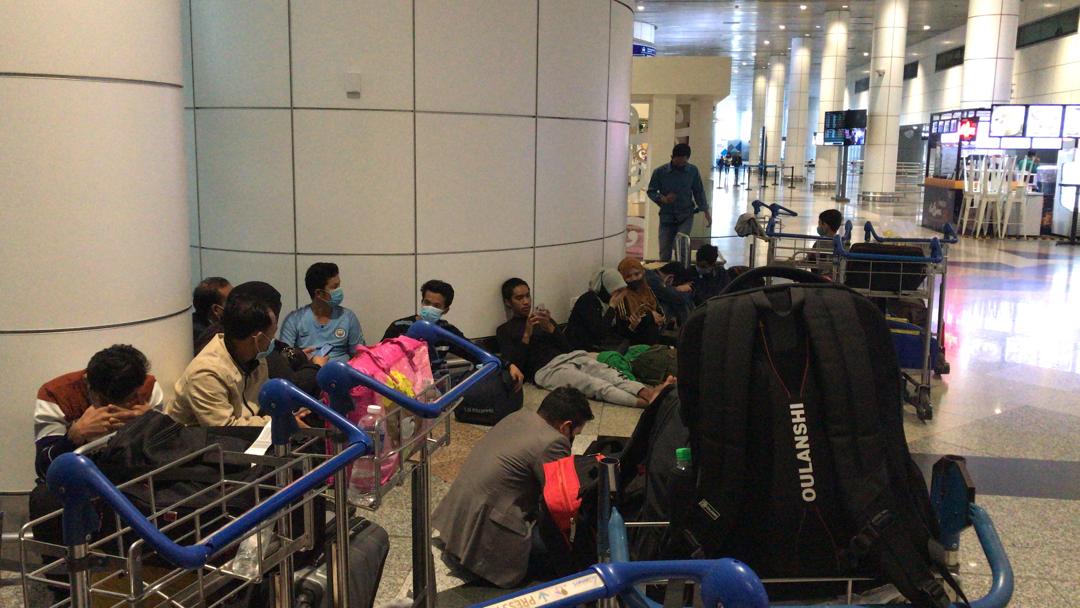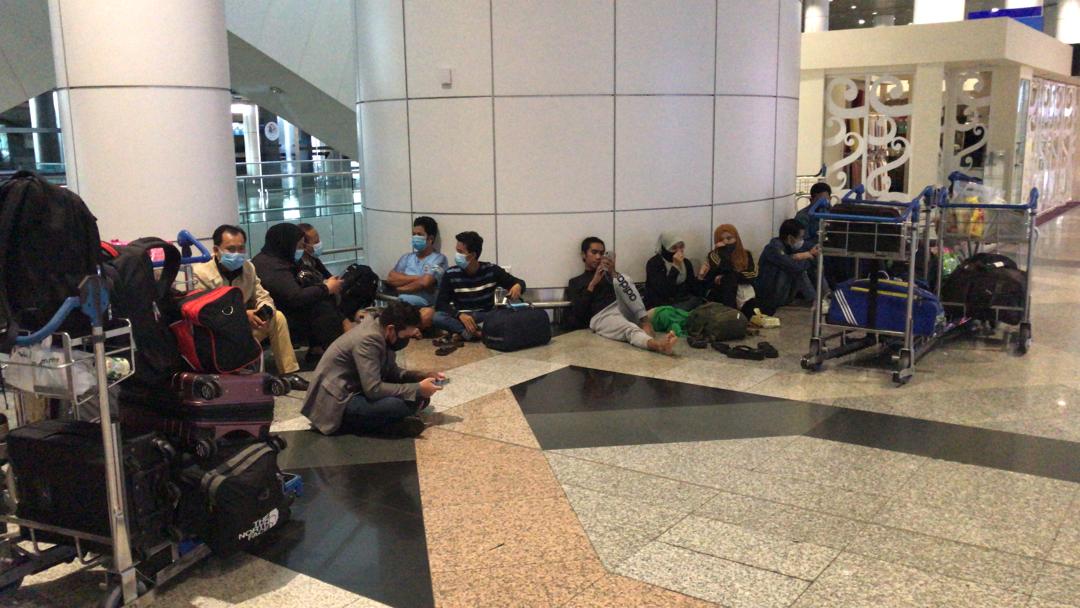Joint Statement on Repatriation of Cambodia Nationals to Cambodia
We, the undersigned civil society groups, call on the Cambodian government to immediately and safely repatriate a large group of Cambodian nationals currently stuck in Malaysia. Permitting their return is consistent with article 40 of the Cambodian Constitution, which safeguards the right of Cambodian citizens to settle abroad and to return to Cambodia, and Cambodia’s obligations under international human rights law.
On April 7, 2020, approximately 150 Cambodian migrant workers and students who had been working and studying in Malaysia were scheduled to take a flight from Kuala Lumpur International Airport to Cambodia. Upon their arrival at the boarding gate, the airline informed them that the Cambodian government had denied their entry to Cambodia and they were not allowed to board the flight for which they had purchased tickets.
Prime Minister Hun Sen confirmed that he had refused their return based on reasons of safety for the country’s population due to the spread of the COVID-19 virus.
Whilst we recognise the seriousness of the COVID-19 pandemic and the need to adopt protective measures to contain the spread of the virus, we call on the Cambodian government to uphold its international human rights obligations.
The International Covenant on Civil and Political Rights (ICCPR), acceded to by Cambodia, provides in article 12(4) the right to enter one’s own country: “No one shall be arbitrarily deprived of the right to enter his own country.” The United Nations Human Rights Committee, the independent international body that monitors compliance with the ICCPR, elaborated in General Comment No. 27 that any restriction to the right to enter one’s own country is arbitrary unless it is “in accordance with the provisions, aims and objectives of the Covenant and should be, in any event, reasonable in the particular circumstances.”
Denying entry to 150 Cambodian citizens in this situation cannot be considered reasonable, especially considering there are less restrictive alternatives, such as allowing them to return to Cambodia and placing them in a mandatory two-week quarantine period upon arrival. Such an approach has proven effective in stopping COVID-19 transmission in many other countries during the pandemic.
On May 27, Prime Minister Hun Sen declared that returning Cambodian citizens did not have to comply with the requirement for new arrivals in Cambodia who will have to possess a COVID-19 health certificates, which Minister of Health, Mam Bun Heng had introduced on April 27. This opens the path for these 150 workers and students to return to Cambodia. However, many of the Cambodian citizens stranded in Malaysia assert that Cambodian embassy officials in Kuala Lumpur have provided them no information to facilitate their return, leaving them uncertain when or whether they will be able to return home.
Since the COVID-19 health and economic crisis, these 150 workers and students are now facing severe financial difficulties as they lost their livelihoods and sources of income, and so are not able to support themselves and their families. Some of them are accompanied by their families, including young children and elderly relatives, while others are the breadwinners for their dependent families in Cambodia.
On May 25, the Cambodian Embassy in Malaysia released a statement, claiming that the embassy was negotiating with the Malaysian government and Malaysia Airlines to get the migrants back to Cambodia. The embassy denied all allegations made by migrants, accusing them of incitement to discrimination aimed at destroying the embassy’s reputation. The embassy specifically named two migrant workers, Marn Pukry and Math Torsry.
Math Torsry, a female migrant worker, has been in Malaysia since 2016. Torsry and her husband are both construction workers. She decided to return to Cambodia in February 2020 as she planned to give birth to her fifth child in Cambodia. After she left Malaysia, Torsry’s husband suffered a work-related injury and could not continue working. This prompted Torsry to return to Malaysia in March to look after her husband. Although she tried her best to take care of him, Torsry’s husband passed away on April 26. She has four children in Cambodia and is eight-months’ pregnant with her fifth. In two emotional interviews with Voice of Democracy (VOD) and Radio Free Asia on May 13, Torsry explained the negative impacts that the government’s decision to block her and other Cambodian citizens’ return is having on her life, and the failure of Cambodian embassy officials to assist them. Torsry appealed to the Cambodian government to help bring her home. Following Torsry’s testimony, the Cambodian Embassy in Kuala Lumpur took some steps to provide for the basic needs of these Cambodians, yet more needs to be done to protect the welfare of these stranded citizens.
Measure taken in response to COVID-19 disproportionately affect people in insecure forms of labour, including migrant workers, low-wage workers, and people working in the informal sector. They may also face additional challenges in accessing testing and treatment when they fall ill. States should ensure that all people have access to social security, including to health care.
Prime Minister Hun Sen’s decision to prevent these 150 Cambodian citizens from returning to Cambodia constitutes a clear violation of the right to enter one’s own country as provided for by the ICCPR and the Cambodian Constitution. Whilst we welcome the change in requirements for returning Cambodian citizens, more must be done. We call on the Cambodian government to immediately and safely repatriate them and other stranded Cambodian citizens wanting to return to Cambodia, and to provide them with access to basic needs and proper health care while awaiting their return as well as pay for the additional costs related to health measures in order to return to Cambodia.
The statement is endorsed by:
- ANUGATHAM – India
- Asia Floor Wage Alliance
- Bangladesh Centre for Worker Solidarity (BCWS)
- Bangladesh Revolutionary Garments Workers Federation (BRGWF)
- Bangladesh Garment and Industrial Workers Federation (BGIWF)
- Bangladesh Independent Garment Workers Union Federation (BIGUF)
- Building and Wood Workers Trade Union Federation of Cambodia (BWTUC)
- Building and Wood Workers’ International – BWI-Asia Pacific
- Cambodia Tourism Workers Union Federation (CTWUF)
- Cambodian Alliance of Trade Unions (CATU)
- Cambodian Food and Service Workers’ Federation (CFSWF)
- Cambodian Human Rights and Development Association (ADHOC)
- Cambodian Human Rights Action Coalition (CHRAC)
- Cambodian Institute for Democracy (CID)
- Cambodian League for Promotion and Defense of Human Rights (LICADHO)
- Center for Alliance of Labor and Human Rights (CENTRAL)
- China Labour Bulletin
- Clean Clothes Campaign – International Office (CCC-IO)
- Clean Clothes Campaign – European Coalition
- Clean Clothes Campaign – CCC South East Asia Coalition
- Clean Clothes Campaign – CCC East Asia Coalition
- Clean Clothes Campaign – CCC South Asia
- Coalition of Cambodian Apparel Workers Democratic Unions (C. CAWDU)
- Coalition of Cambodian Farmers Community (CCFC)
- Committee for Free and Fair Elections in Cambodia (COMFREL)
- Dabindu Collective Sri Lanka – Sri Lanka
- Equitable Cambodia (EC)
- Free Trade Zones and General Services Employees Union – Sri Lanka
- FORUM-ASIA
- Garment Labour Union (GLU) – India
- Garment Allied workers Union (GAWU) – India
- Human Rights Watch
- Home Based Women Workers Federation (HBWWF) – Pakistan
- Home Net Pakistan – Pakistan
- Independent Democracy of Informal Economy Association (IDEA)
- Independent Trade Union Federation (INTUFE)
- International Labor Rights Forum (ILRF)
- Labor Rights Supported Union of Khmer Employee of Naga World (L.R.S.U)
- Labour Education and Service Network
- Maquila Solidarity Network (MSN)
- National Garment Workers Federation (NGWF) – Bangladesh
- National Trade Union Federation Pakistan (NTUF) – Pakistan
- National Trade Union Federation (NFTU) – Sri Lanka
- Nepal Garment Workers Union (NGWU) – Nepal
- North and South Imitative – Malaysia
- Pakistan Institute of Labour Education and Research – Pakistan
- People Center for Development and Peace (PDP-Center)
- Sahmakum Teang Tnaut (STT)
- Social Awareness and Voluntary Education (SAVE) – India
- Suara Rakyat Malaysia (SUARAM)
- Worker’s Solidarity Strength of Independent Union Sixplus Industry Co. Ltd.
- Women’s Center – Sri Lanka
- Youth Resource Development Program (YRDP)




